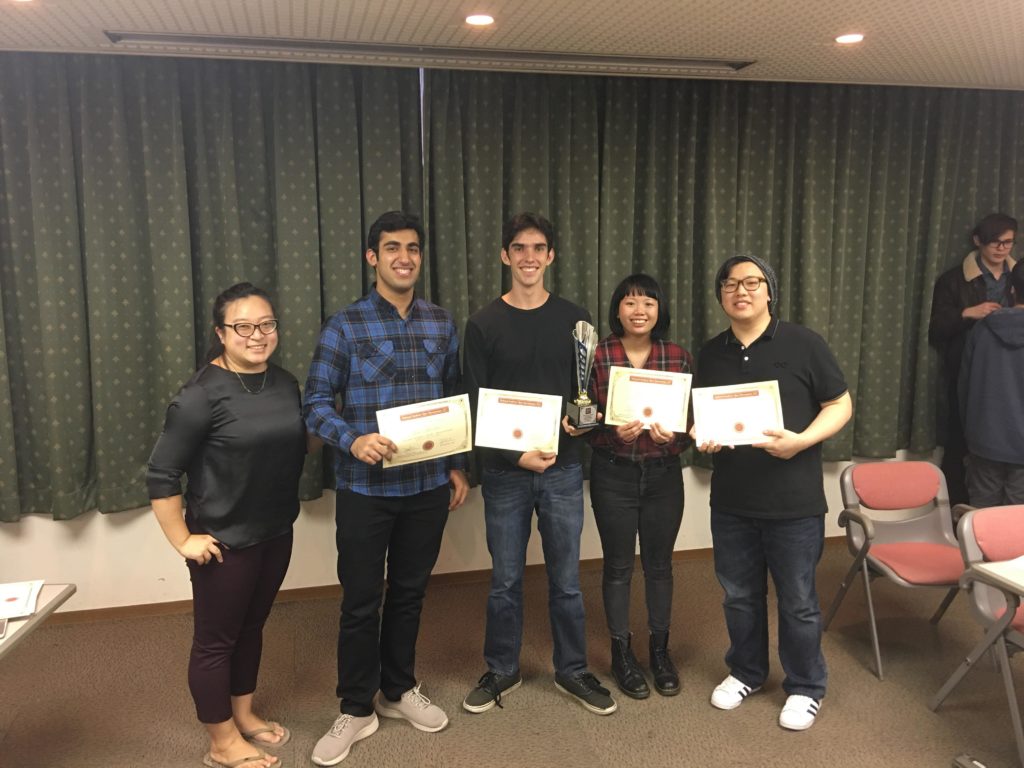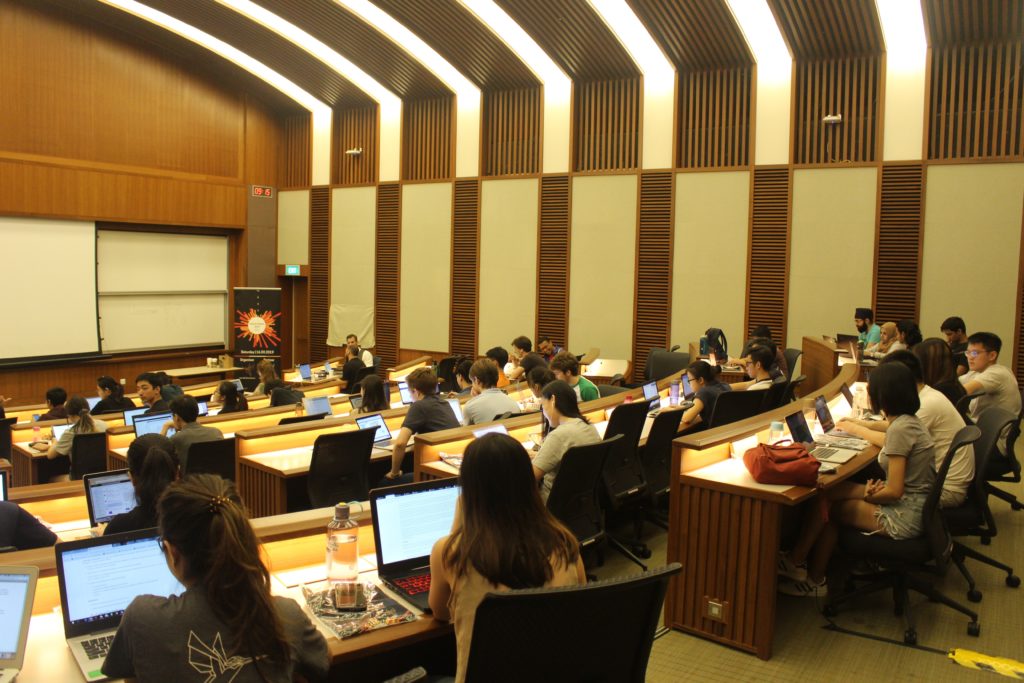New student organisations contribute to the vibrant campus community in Yale-NUS
 Roosevelt Institute’s panel discussion on domestic workers’ rights in Singapore. Image provided by Vivien Su.
Roosevelt Institute’s panel discussion on domestic workers’ rights in Singapore. Image provided by Vivien Su.
When she was a first-year student at Yale-NUS College, Vivien Su (Class of 2021) realised that students in the community often came up with many great policy ideas, but there was no platform available to bring those ideas forward.
During a campus life exchange in 2018, she found out about the Roosevelt Institute, an American think tank with over 130 chapters in various cities and university campuses across the United States, from some students at Yale University, and decided to set up a chapter at Yale-NUS as well.
The Roosevelt Institute was one of several new student organisations set up over the past academic year. At Yale-NUS, there is a diverse array of student organisations set up and run by students. These bring together people from both within and outside the College community in their events and activities, contributing to the vibrant extracurricular life on campus.
“The Roosevelt Institute not only trains its members to solve problems, but also pushes them to consider which problems to solve and why. By establishing meaningful partnerships with other organisations and academic institutions, the group is a catalyst for positive change in the local community,” said Vivien.
Since she founded the Roosevelt Institute here with a few other students, the organisation has held multiple events on campus, which contribute to a lively climate of discussion and exchange of views. This includes the launch of The Review, the group’s policy journal, as well as film screenings and panel discussions.
According to Annabelle Ho (Class of 2021), who heads the group’s Equal Justice and Human Rights policy centre, the group decides on a particular policy issue to focus on each semester – most recently, the vulnerability of foreign domestic workers to abuse and human rights violations.
“We organised a film screening of Ilo Ilo (a 2013 film by Singaporean director Anthony Chen that depicts the relationship between a young boy, his parents, and his foreign domestic worker) and a panel discussion to start a conversation on campus about domestic workers and their legal rights in Singapore,” Annabelle shared.
The panel discussion involved representatives from the Centre for Domestic Employees, the Asia Research Institute and Yale-NUS faculty.
Members of the Roosevelt Institute also recently won the National University of Singapore (NUS) U@live essay competition on inequality and the education system. U@live is a platform launched by the NUS Office of Alumni Relations to showcase the thought leadership of, and generate innovative ideas from, members of the NUS community.
The essay was published in local news website and the authors were invited to speak at the NUS U@live forum on the same topic with Singapore’s Education Minister Ong Ye Kung, Mr Andreas Schleicher, Director for Education & Skills at the Organisation for Economic Co-Operation and Development, and Yale-NUS President and Professor of Humanities (History) Tan Tai Yong.
 The Yale-NUS Quizbowl Society placed second overall in the 2019 Tokyo International, the first Quizbowl competition open to college-level students in Asia. Image provided by Andre Wong.
The Yale-NUS Quizbowl Society placed second overall in the 2019 Tokyo International, the first Quizbowl competition open to college-level students in Asia. Image provided by Andre Wong.
At another new student organisation – the Quizbowl Society – Yale-NUS students are trained to solve other types of problems. Quizbowl is a team game in which competing teams battle to answer questions faster than their opponents. These questions are mostly of an academic nature, featuring topics as diverse as history, literature, classical music, biology, religion and geography.
The group was formed shortly after Andre Wong (Class of 2021) was approached by a few other students following a trivia night he had organised for the College community, but his interest in the activity stretched back much further.
“I first discovered Quizbowl when I was 14, so I’ve been directly or indirectly participating in it for eight years now. As someone who was very intellectually curious, especially in topics like neoclassical painting or Greek mythology that aren’t often taught pre-college, I had an avenue where my knowledge could manifest tangible results,” he said.
The group hosts weekly practices on Thursdays and organises trivia nights for the larger Yale-NUS community every semester. These are very well-attended, with an average of 60 to 70 participants. Each round is themed around a specific topic, and there is a higher proportion of questions on popular culture.
“I love watching players get very excited or emotional in moments when topics are revealed, or when they get a hard question correct!” said Andre.
The Quizbowl Society has since participated in the Tokyo International, the first Quizbowl competition open to college-level students in Asia, in which they placed second overall. They plan to participate in the Intercollegiate Championship Tournament in the United States in the future as well.
 Hack4Climate, Singapore’s first social impact blockchain hackathon and datathon, was organised in March this year. Image by Walter Boo.
Hack4Climate, Singapore’s first social impact blockchain hackathon and datathon, was organised in March this year. Image by Walter Boo.
Catering to Yale-NUS students’ growing interest about the technology underpinning cryptocurrency, the Blockchain Society was launched over the past year.
Walter Boo (Class of 2021) was keen to set up the organisation after Bitcoin’s price soared to unimaginable heights in late 2017.
“I was particularly compelled by the amount of fear, uncertainty and doubt about these technologies. Our group aims to clarify these doubts from an academic standpoint and make blockchain technology accessible for all,” he said.
For Julian Chong (Class of 2021), what was most interesting about blockchain was its potentially transformative effect on the world.
“To use an analogy, aircraft were practically non-existent a century ago, and have had an outsized effect on the way human society has changed in the time since. I think that blockchain would be similar in its effects. By studying it, we can understand how such change occurs, if we look hard enough,” he said.
In March this year, the Blockchain Society co-organised Hack4Climate, Singapore’s first social impact blockchain hackathon and datathon, in collaboration with Yale-NUS Data Science, a student-run data literacy club. The event was open to tertiary students outside Yale-NUS, and brought together many enthusiasts from both within and outside the College.
Lucy Zhu (Class of 2022) shared that the liberal arts approach that the group adopts has helped her to broaden her imagination on the application of blockchain.
“It got me thinking about the broader social impact of this technology – what do decentralised models of operation look like, and who are the beneficiaries? I don’t have a clear answer yet, but I will continue my interdisciplinary exploration,” she said.





